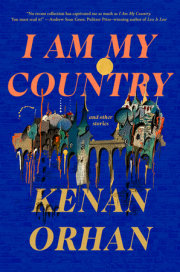The Beyoğlu Municipality Waste Management OrchestraSelim the halfwit hoarded everything from the trash—that was the story they told me my first day on the job at the waste management office. Selim had lost his wife, and I guess everyone figured he’d taken up hoarding as a way to fill the hole. It started out with stuff his wife might have liked—small earrings, a tea set, owl statuettes—picked out of the top of garbage bins. But the way it goes, everyone said, it’s not long until you’re taking home half the bin, raking through it for treasure and convincing yourself of the value of each thing. How stupid, you say, how stupid of people to discard such beautiful and useful things. Well, Selim ended up with a house packed to the rafters with trash he’d thought was gold. He tucked it onto shelves and into stacks, put it in cupboards, under floorboards, couch cushions, and the mattress, until there was no space left but overhead. Then he installed a system of boards and beams into the frame of the house, with maybe two or three inches of clearance from his head, in order to pile trash above him. More and more he took from the waste bins: old tattered books, bicycle bits, apple cores, orange peels, broken printers, smashed-up furniture, crumpled cartons and boxes, hundreds of kilograms of paper, pens, eyeglasses, eggshells, water bottles, shoes with holes, sleeping bags with urine stains, jackets too small, jackets too large, bedframes, filing cabinets, coffee mugs, coffee grounds—on and on, an impossible list of trash weighed down on those boards and beams until at last, while his dreams of finding his wife in all this waste were licking the night sky, the house’s framing broke and the collected works of the city’s refuse crashed down upon Selim the halfwit, killing him not instantaneously, but swiftly enough to confuse Selim into believing in his deliverance.
The garbagemen laughed at the end of the story, and then the oldest one, without a hint of jest, indeed with genuine concern, said to me: “And you are doubly at risk, because a woman hoards more than a man.”
And the other garbagemen stopped their laughing and nodded solemnly. The nearest to me said: “We make light of a truth; it is easy to find the merits in another’s garbage if only because we hope someone will treat our own legacies with such care.”
I smiled and laughed and so did they, and they all went out to their tasks. I found my assignment: a truck helmed by two men named Hamit and Mehmet. I hopped into the cab. The older man, Hamit, drove us off to our route, and as he did Mehmet said that I shouldn’t take anything the others said seriously. “Garbagemen, for who knows why, make up myths and tales more readily than any other profession. Still, it is not good to take from the trash. Once you start, there’s no stopping. Eventually you’ll find yourself buried under it.”
A day became a week, became a month, became a year as it happens. Mehmet and Hamit made me go down the thinnest alleys of Beyoğlu because they had round bellies they couldn’t squeeze between the buildings, and they laughed at themselves so that their laughter accentuated their jiggling, round bellies. They gave me a slender handcart to navigate and said, “So long, we’ll see you at the end of the maze.”
I went down the thin alleys because I was the thinnest, but it’s not hard to be the thinnest garbageman when you’re a woman. My small handcart scraped its sides against brick and stucco and stone—sometimes, too, my shoulders would scrape the walls, and I worried that over time I might erode a small Elif-shaped tunnel into the alley, or worse, the alley would grind me down into a rectangle.
I stopped at the small back doors and loading zones, the garbage bins always stuffed to overflowing, but really only half full because people are very bad at the economy of space. I emptied the bins into my handcart and continued on to the next little station, on and on all afternoon until I came out the other end of the byzantine alleyways soiled and sweating. Then I waited for Mehmet and Hamit to finish their route in the truck and pick me up. They didn’t make me squeeze between them in the cab. Whoever was in the passenger seat always moved over to let me sit by the rolled-down window.
You can tell a lot about someone from the way their trash comes to occupy a trash bin. Take, for example, the bin I pull from this sunny corner—crooked between a barbershop and a pizza place: every day it’s full of sheets of music, not the kind printed in a book and tossed out by someone quitting the piano, but handwritten compositions, sometimes crumpled in disappointment, sometimes scribbled over with one, two, three layers of corrections. The man who lives on the second floor is a composer, that explains it. I don’t know the first thing about reading music, and even less about listening to it. From the state in which I find the pages, I can tell the man is tortured by the impossibility of translating what swirls around his soul into a symphony that would render the same swirlings in the soul of a listener, and that is enough for me to know that his music is beautiful. I told Mehmet about the composer, even showed him a few sheets of music, and Mehmet shrugged. “Or else a piano teacher, or else a student, or else a lunatic. How can you know if you don’t read music?” He went back to arguing with Hamit over national policy.
Without any reason, I promised myself I’d find something to convince Mehmet it was a beautiful composer’s trash bin. But the next week I found nothing in the bin, and the week after that, nothing again. Not one sheet of music in the trash, not even so much as a single note scratched onto a napkin, or a used-up rosin block, or even a banana peel with fret marks pressed into its skin from distractedly being eaten while practicing a vibrato. No, the old man must be sick, I thought, come down with a summer cold. It was a shame; I enjoyed collecting the composer’s trash if only for the reprieve of tending to something precious, of being entrusted with the death of the beloved machinations of one’s art. Trash, just trash, unadorned, unloved. Scorned because it announces decay, and decay is the product of time, and time is the fear of all living things. You look for small grandeurs in my line of work. A month here and you’d be singing odes to those rare, crumbless toasters.
“Do you think he’s died?” I asked Mehmet. We were in the cab of the truck, watching Hamit drag a large bin full of sardine tins across the street.
“Who?”
“The old composer.”
“Old men are in the habit of dying,” he said.
Somewhere a faucet was loosing dribbles of water over the flagstones of the alley and in a mirror of the rivulets, the muezzin’s call to prayer slid over the grooves of the sky. Anything to beat the heat had me with my uniform off and over my head. My undershirt was soiled, the cuffs of my trousers slicked by the puddles. I dragged my cart behind me to the next bin: the composer’s. I lifted the lid, expecting to find nothing once more and so resign myself to my worst fears, but instead, deep in the receptacle, I spied a small instrument laid gingerly over a pile of clean newspapers, more precious than a pair of china cups in packaging.
I pulled the instrument up and knew at once to save it from the trash, knew at once to do the only sin of a garbageman and keep this piece. The violin had obviously been loved. I took up the instrument into my arms. The patina held that precious luster of esteem that seemed to catch the light in even the darkest nooks—a compass for the sun, liquid as the glow of a freshly skinned onion. The top and bottom bouts were plump and milky and luxuriant. The border of the instrument was purfled with an inlay of ebony sandwiched around a thin strip of mother-of-pearl. Nestled into the scroll was a finely carved initial I couldn’t quite make out. The only signs of wear throughout the whole instrument were in the peg box and the chin rest (which surely wasn’t the original chin rest), as if throughout its life the violin had been conducted by a pair of spectral hands.
I had before prized a few items I’d found discarded, keeping them in a pocket or sneaking them into the cab of the truck only to find them broken and dingy in the new light of my apartment, and so I’d later place them in my own trash bin or leave them along the side of a road or buried under the retaining wall of a cemetery leaning down a hill. But when you come across a truly unbroken thing, it is a miracle, blessed, pure.
There was a new instrument in the composer’s trash bin each week. I would, excited as a young girl on my birthday, run up to the composer’s bin, peel off the lid, poke my nose inside, and fish out either an immaculate violin, or viola, or bow, or hand-carved music stand, or once even a cello, always placed delicately on a bed of clean newspapers. Mostly, it was easy sneaking them home—I was the last person to put anything in the back of our truck and would hop out of the cab as fast as an eel when we arrived to the dump so that I could retrieve my newspaper-wrapped treasure before anyone saw it. Then it was quick goodbyes, see-you-tomorrows, and I was off for home with my bundle in the seat beside me.
Copyright © 2023 by Kenan Orhan. All rights reserved. No part of this excerpt may be reproduced or reprinted without permission in writing from the publisher.






